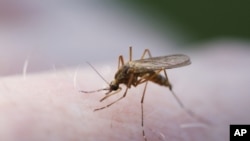The Global Fund to fight AIDS, Tuberculosis and Malaria says unprecedented progress has been made in combating these three major killers in the developing world.
Since the Global Fund to Fight AIDS, Tuberculosis and Malaria was established in 2002, it has wracked up an impressive list of achievements - among those, the Fund says, is saving at least 3,600 lives every day and preventing thousands of new infections.
As of December 2009, the public/private partnership has provided anti-retroviral therapy to 2.5-million HIV victims. It has provided treatment to six-million people who have active Tuberculosis, and it has distributed more than 100-million insecticide-treated nets to prevent malaria.
Executive Director of the Global Fund, Michel Kazatchkine, says the organization can achieve even more if it receives the money needed to carry out its life-saving mission.
"By 2015 ... we could eliminate malaria as a ... major public health problem," Kazatchkine said. "We could save millions more lives with HIV treatment. We could prevent millions more HIV infections. We could be on track with international targets on TB. We could further strengthen health systems and we could further impact on maternal and child health and decrease maternal mortality."
Kazatchkine says a number of countries are on track to achieving the Millennium Development Goal to halt and begin to reverse the spread of HIV/AIDS, malaria and other major diseases by 2015.
For example, he says 10 of the 12 most malaria endemic countries in sub-Saharan Africa have made great progress in cutting child mortality. Only Nigeria and the Democratic Republic of Congo are lagging behind.
In the fight against HIV/AIDS, he says access to AIDS treatment has advanced significantly in South Africa, Botswana, Zambia, Tanzania and Rwanda.
He says poor countries with weak health systems, such as Nigeria, DRC, Liberia, the Central African Republic and Niger are still struggling to contain the spread of the disease.
This year, the Global Fund will be asking donors to support programs in developing countries for a three-year period, between 2011 and 2013. Kazatchkine says $20-billion would be required to continue the funding of existing programs and significantly scale up well-performing programs.
Unprecedented Progress Cited in Combating AIDS, Tuberculosis and Malaria
- By Lisa Schlein




